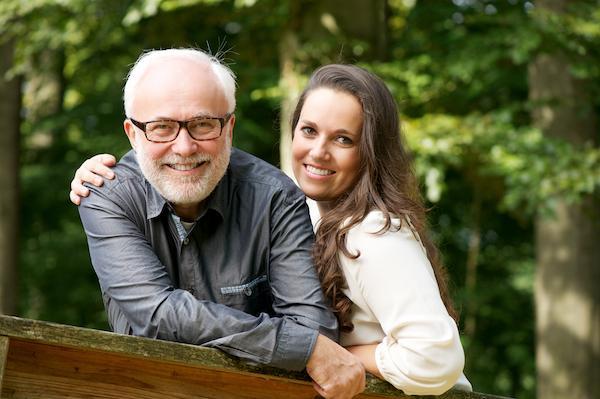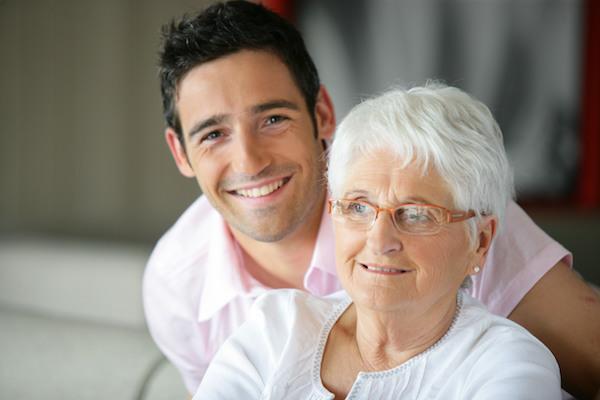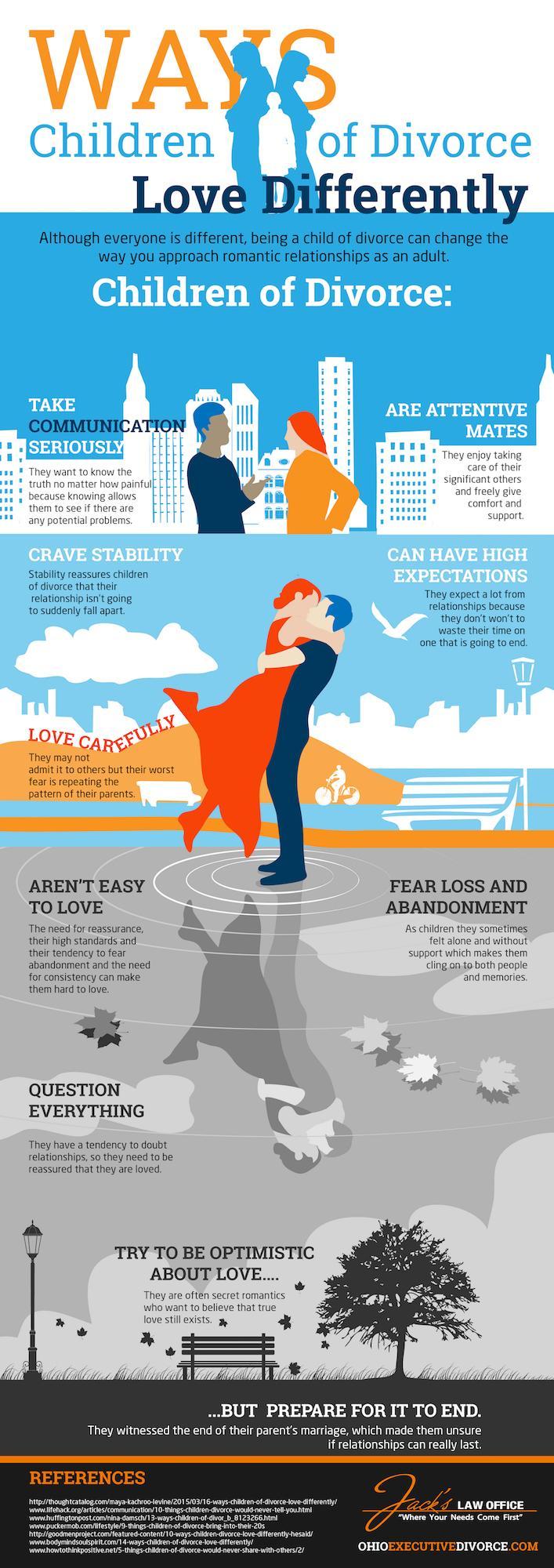Even the experts have trouble agreeing, but the divorce rate for first marriages is believed to be about 45%. As a Family Law Attorney, I see families at all of the different stages of the divorce process. Ending an unsatisfactory relationship isn’t necessarily a bad thing, but there is no denying that it has an affect on every family member. During the divorce it’s important that parents act responsibly — make children feel involved in key decisions throughout the process and not expose children to adult disagreements. Uncertainty about the future and being exposed to constant conflict are what’s most damaging for children, not the fact of divorce itself.
You can’t paint every child of divorce with a wide brush — there are a large range of differences in how children react to divorce, so it’s not possible to say how everyone will deal with the situation. But when you have divorced parents, dating and relationships can become complex. Children learn from their parents who and how to love. It’s only when they are adults themselves, that children of divorce see how their parents splitting up affected their view of romantic relationships.
 If you are a child of divorce—or love someone who is, don’t despair. Recognizing the ways that children of divorce love can help you heal and move into healthy relationship patterns. Children of divorce have the advantage of understanding both the good and bad of romantic relationships. Even so, there are certain complications that anyone in a relationship with a child of divorce should keep in mind.
If you are a child of divorce—or love someone who is, don’t despair. Recognizing the ways that children of divorce love can help you heal and move into healthy relationship patterns. Children of divorce have the advantage of understanding both the good and bad of romantic relationships. Even so, there are certain complications that anyone in a relationship with a child of divorce should keep in mind.
CHILDREN OF DIVORCE:
Take Communication Seriously. Most marriages break up because the spouses don’t or won’t communicate, or tend to focus conversations on the wrong things. (link to other blog article). Children of divorce take communication seriously. They saw what communication styles didn’t work—whether it was constant arguing or completely ignoring each other—and don’t want to make the same mistakes. Short answers like “I’m fine” or “nothing” aren’t acceptable responses for a child of divorce. They are very aware when something is wrong and won’t be satisfied with those answers. Children of divorce want to know the truth, no matter how painful, because knowing the truth allows them to get to the heart of the problem quicker. Most children of divorce won’t get in long-term relationships with partners who aren’t good communicators.
Love Carefully. Children of divorce are more careful of love because they know it makes them vulnerable. They have seen heartbreak first hand and know that relationships are fraught with risks. Children of divorce are heavily guarded with their hearts and take long-term relationships earnestly. They search for any danger signs or red flags that could cause trouble in the relationship. They may not admit it, but their worst fear is repeating the pattern of their parents by getting divorced themselves.
Question Everything. Trust is difficult for children of divorce. They have a tendency to doubt love relationships, which makes them question both their mate and the status of their relationship. This questioning can be trying for partners, but children of divorce would rather ask questions than be blindsided by an unpleasant surprise. Children of divorce often need to be reassured that they are loved—through both words and actions. Things as innocuous as text messages, emails or off-hand remarks can cause endless overthinking.
Are Attentive Mates. Children of divorce understand what being a caregiver involves. They have often taken care of and comforted parents during the divorce process and continue to do the same for their partners as adults. They freely give comfort and enjoy showing their loved ones how they feel.
Crave Stability. Divorce brings about several changes for both parents and children. For children of divorce these changes may have included the loss of friends, moving to a new residence and changing relationships with extended family members. Children of divorce were usually shuttled between two houses—sometimes on a weekly basis. The rules, routines and consequences were often different with each parent. Stability reassures children of divorce that things are not going to suddenly fall apart.
Can Have High Expectations. It’s sometimes easier to see imperfections before strengths when you come from divorced parents. Children of divorce tend to look for any potential flaws—even on the first date. They expect a lot from long-term relationships because they have seen relationships end and don’t want to waste their time.
Fear Loss and Abandonment. Children of divorce know that what their parents went through was difficult, but they often felt alone and without support themselves. They went from a house with two parents to a house with one parent. This caused them to suffer from feelings of loss and fear of abandonment—even if those parents were able to cooperate with each other. This irrational fear of abandonment can be carried over into adult relationships, causing children of divorce to hold onto their partners, sometimes to the point of being clingy. They will hold on fiercely to both people and memories.
Aren’t Easy to Love. The high expectations, the need for stability and fear of abandonment, the questioning of whether or not a partner still loves them can make them harder to love. For children of divorce, love is often associated with pain. A child of divorce can be unsure of whether or not they truly deserve to be loved.
Try to be Optimistic About Love . . . The effect of divorce on children can be very different, some adult children of divorced parents become determined to make their marriages last, while others avoid long-term relationships. Children of divorce are often closet romantics. Children of divorce want to believe that true love still exists and that they will find it. They were often told that their parents still loved each other, but it just didn’t work out. They often believe that a connection exists, even when a relationship no longer does.
. . . But Prepare for it to End. They saw the end of their parent’s marriage and may have adopted a pessimistic attitude about love and relationships. The thought of spending a lifetime with someone is desirous but scary. Children of divorce can assume that people will leave and relationships will end. Will they be able to build a healthy marriage when they never witnessed one? Will they be able to keep the relationship promises that their parents weren’t able to?
The challenge of marriage, though, is not acting on those fears. It’s important to remember that not every child whose parents’ divorced will have bad relationships, just like every child whose parent has a disease will not get the disease. Children of divorce are more likely to spot relationship problems and avoid toxic people. They are often able to overcome obstacles quicker and are more resilient.
Healthy love can’t come from a place of worry, it has to come from being proactive about relationships. There are strategies for improving relationships and developing committed long-lasting and happy marriages, but it doesn’t just happen. Relationships take work. Even for children of divorce, relationship skills and attitudes about marriage can be changed and improved.
Have questions about divorce? Contact Jack’s Law Office at (740) 369-7567.
DISCLAIMER:
Jack W. Carney-DeBord is licensed and admitted to the practice law in the State of Ohio-ONLY. Jack has no intention of soliciting clients in any state other than Ohio and nothing posted on this website should be viewed as any attempt to solicit or do business in ANY state other than the State of Ohio.
The content on this website is provided as general information only and is not legal advice. You should not act or refrain from acting based upon information provided in this site without first consulting legal counsel.
Visit Jack W. Carney-DeBord’s website at ohioexecutivedivorce.com






